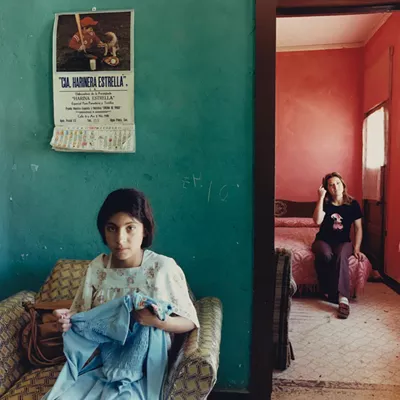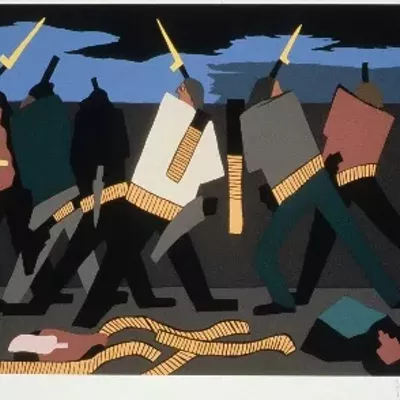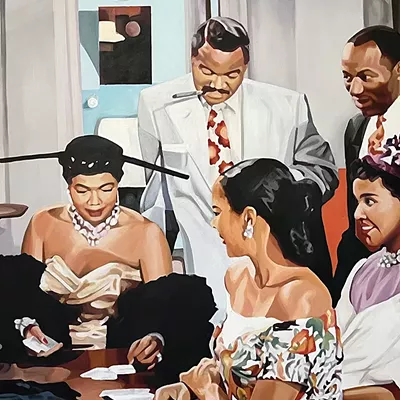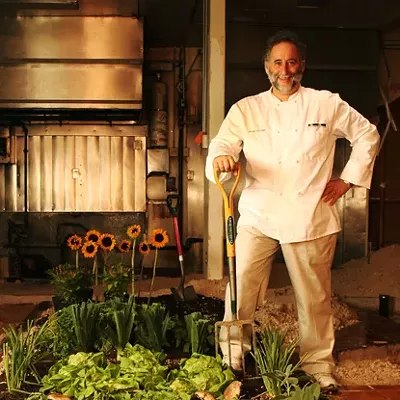Dusk is fast gathering over the lowslung mountains behind him, and he's ready to slide into his sleeping bag. He's tired--and no wonder. This morning, Ableser walked 16 miles through the desert as part of the fourth annual Migrant Trail, a weeklong trek meant to call attention to the deaths of border crossers in the desert. The temperature reached a hot 97.
"This is an opportunity to walk in memory, celebration and awareness of the people who have lost their lives in trying to better their lives," Ableser says, delivering a well-crafted sound bite despite his fatigue. "I've been taken care of here," he adds. "I can't imagine what it's like for someone just walking with a 2-liter bottle of water."
Ableser intends to recount his pilgrimage to his colleagues in the state house up in Phoenix, but he's just one of 40 to 50 walkers making the seven-day trek. Hailing from Pennsylvania, Virginia, Texas, Colorado, California and Oregon, as well as Arizona, many of his fellow participants are religious--two Franciscan friars are marching in long, brown robes--and conceive of the trip in religious terms.
"As a Christian, I'm called to be a welcomer who makes a place for the immigrant," says Dan Abbott, a retired social worker and Presbyterian from Tempe who's pitched his tent near Albeser's. "It's a spiritual journey, too. The desert is a theme running through the scriptures."
Friar Martín Ibarra says he himself crossed the border illegally back in 1989, when it was less dangerous. Now, as a Franciscan, he follows the "charism"--or religious mandate--of his order.
"We are on the side of the poor, the marginalized, the broken," he says, taking a rest after what he calls "four very long days."
"That's who we are. I march in solidarity with my brothers and sisters crossing the border."
Ibarra, Abbott and the rest are traipsing the 75 miles from the border town of Sasabe to Tucson, a major route for migrants who've illegally crossed into the United States. (The group departed on Memorial Day, May 28, and arrived in Tucson on Sunday, June 3.) The walk is timed, says Jodi Read, a walker who works with the West Coast Mennonite Central Committee, to coincide with the "beginning of the death season."
So far this fiscal year, which began Oct. 1, known migrant deaths number in the high 80s, but the toll typically skyrockets during the 100-degree days of summer.
Each walker wears a white cross emblazoned with the name and age of a dead migrant. (Ableser's is Mario Castillo Fernandez, age 26.) The walkers believe they can raise people's consciousness about the deaths, even if their trek is not heavily covered in the media. The can bring their stories back to their far-flung communities.
Lani Jo Leigh, a filmmaker and writer from Portland, Ore., is an "avid walker" who began walking marathons at the age of 50. She touches the cross on her chest--painted with the name of the late Margarita Guerra Escalera, age 44--and says she'll tell her Episcopal church back home what she's learned.
"I can take it back to my own community," she says. "In Portland, we don't know it the same way they do on the borderlands."
But at a time when the volume of angry discussion of illegal immigration is turned way up, the walkers want to do more than bring attention to the desert deaths. They want conditions to change, explains Tucson's Guadalupe Castillo, as she sits in a folding lawn chair after dinner. Co-chair of Coalición de Derechos Humanos, Castillo drives a support van for the Migrant Trail each year.
"We need to change this broken policy that has brought us down this dark path of death," she says. "We promised ourselves we would march until the deaths ended."
I've caught up with the travelers at their camp on the fourth day and longest leg of their journey. Most days, they rack up 10 or 12 miles, but on day four (Thursday, May 31), they started out at 4 a.m. in the rough terrain of the Buenos Aires National Wildlife Refuge and ended 16 miles later on the side of Route 286 by noon. A caravan of vehicles follows along, carrying camping gear, food, water, medical supplies and even portable toilets. Church groups drive out with meals every lunch and dinnertime.
Tonight, the group is camped at Caballo Loco Ranch, a scenic RV park 8 bumpy dirt miles east of the highway. To the walkers' delight, the Caballo is equipped with hot showers and flush toilets.
As the sun sets over the camp, ringed by small mountains and dotted with just a few trailers in the hills, the walkers are at their leisure. Two men are playing guitars, and Leigh, the Portland filmmaker, is singing "I'm on My Way to Freedom Land" in a clear and lovely soprano.
Nearly everybody's brought along a folding camp chair, and they've freed their weary feet from their heavy walking shoes. They're wiggling their toes in the air, on orders of the trek nurse, Jessica Sanchez, of Denver.
To prevent blisters, "We have them wear flip-flops in the evening," Sanchez says. "And clean socks every day."
The walkers don't begin to pretend that their journey, backed up by the support team, is as difficult or as dangerous as the hikes migrants take every day. They don't have to carry water. They don't have to hide from the Border Patrol. They can get a ride home if they feel ill.
"To be cared for is incredibly nurturing," says Delle McCormick, executive director of Tucson's BorderLinks group, speaking in her comfy folding camp chair after the evening meal, cooked up by volunteers at a church in Green Valley. "It's nothing like what the migrants go through."
The migrants have to worry about desert perils--dehydration, snake bites, cactus spines--as well as the Border Patrol, Abbott points out.
"Early this morning, a Border Patrol helicopter shone a light on us," Abbott says, "I didn't feel at risk," as the migrants would. "Five minutes before that, somebody saw a rattlesnake. For the migrants, there's a danger to be had from the physical environment and danger from the Border Patrol."
Still, the Migrant Trail walk is tough, and it's hot. Carrie Fox, a Presbyterian church volunteer and BorderLinks staffer, displays the multiple bandages wrapped around her feet.
"My feet are a sad story," she says. "I have a lot of blisters--a total count of 18."
Sanchez says she had to send a woman home to Green Valley a few days before. The woman felt weak and dehydrated and, despite a little TLC, didn't get better. The group leaders are not about to risk anyone's health or life, Sanchez says.
And the nights can be tough, too. Ableser kindly gets me a tarp on which to lay my sleeping bag, and he directs me away from a fierce red-ant colony. But even a camping pad can't make the ground soft, or less rocky. The nearly full moon is beautiful, but its slow, bright journey from east to west over the course of the night chases off sleep. Coyotes howl periodically. And around 3 a.m., the temperatures turn cold enough to make me shiver in my sleeping bag.
Reveille is at 4:30 a.m., in the dark chill. "Good morning, buenos días," an early bird calls out as he circles the camp. "Time to get up."
Breakfast and coffee are still an hour and a half away. Under the watchful eyes of a half-dozen curious deer on the ridge, the walkers crawl out into the chill, collapse their tents, pile their gear into the trucks and fan out to pick up stray bits of trash.
Then everyone piles into trucks for the bumpy ride back to the road. I sit next to Francisco Avalos, a cheerful Californian recently transplanted to Tucson. He's stowed a little beef jerky into his pack, he says, as a small counterweight to the week's veggie menus. "The first thing I'm going to do when I get back is have a steak dinner," he declares.
The name on Avalos' cross is desconocido, unknown/stranger, to represent the many desert dead who are never identified.
"My parents were immigrants," he says. "My goal is to better understand my parents, and to become a better person."
At the roadside, the walkers gobble down bean burritos left over from last night, and swill coffee before doing stretching exercises. Then they recite a prayer.
"Loving Creator, have pity on my migrant brothers and sisters," they intone. "Make them be respected and valued for their dignity."
Then, at 7 a.m. precisely, they line up single-file on the side of the road. The sun has already burned off the morning's chill and turned the day hot. The first in line hoists a big white cross painted with the word Presente (we are here), and off they go at a fast pace, marching toward Three Points and its Serenity Baptist Church, 12 1/2 miles away.













